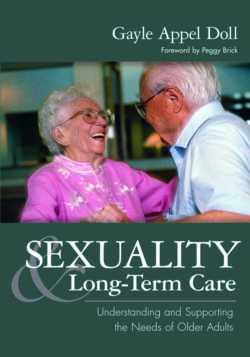Sexuality and Long-Term Care
Understanding and Supporting the Needs of Older Adults
Gayle Appel Doll, M.S., Ph.D.
Activity 2.1 Example
An Aging Stereotype Quiz
To test your beliefs regarding aging, answer true or false to the following questions.
_____ True _____ False
The majority (more than 50%) of olderadults will become senile (memory loss, disorientation, dementia) during old age.
_____ True _____ False
Most older adults have no desire or capacity for sexual relations. In other words, most older adults are typically asexual.
_____ True _____ False
Chronological age is the most important determinant of someone’s age.
_____ True _____ False
Declines in all five senses normally occur at old age.
_____ True _____ False
Intelligence tends to decline at old age.
_____ True _____ False
In general, most older adults tend to be pretty much alike.
_____ True _____ False
The majority of older adults say that they are lonely.
_____ True _____ False
Old age can be characterized as a second childhood.
Question Answers
- False. The majority of older adults do not become senile. Dementia is not a normal part of aging. It is only after the age of 85 that as much as 50% of the population may have some form of dementia. The numbers are far lower at earlier ages.
- False. Sexuality continues to be an important part of the older adult’s life. People can enjoy sexual relationships well into late life. Sexuality need not be considered as merely a biological function. Sexual expression can take many forms.
- False. People age in many different ways, and chronological age is the least important. It is more important to consider functional age, which is made up of psychological age, social age, and biological age. Everyone is different.
- True. Most people will experience some declines in the five senses as they age.
- False. For the most part, any declines in intellectual functioning may be caused by disease rather than age.
- False. Older adults are more diverse than any other age population, as they have had years of varied experiences and developmental opportunities.
- False. Although loneliness is one of the greatest fears of older people, two-thirds report rarely, if ever, feeling lonely.
- False. Older adults are adults and always should be treated as such, even if incapacitated because of disease.
Source: Based on Palmore’s work with stereotypes (1998). Adapted from Aging Quiz, Linda M. Woolf, Webster University at www.webster.edu/~wolflm/myth.html. Be sure to check the website for additional questions.
Sexuality and Long-Term Care: Understanding and Supporting the Needs of Older Adults, by Gayle Appel Doll(Copyright 2012, by Health Professions Press, Inc.)

